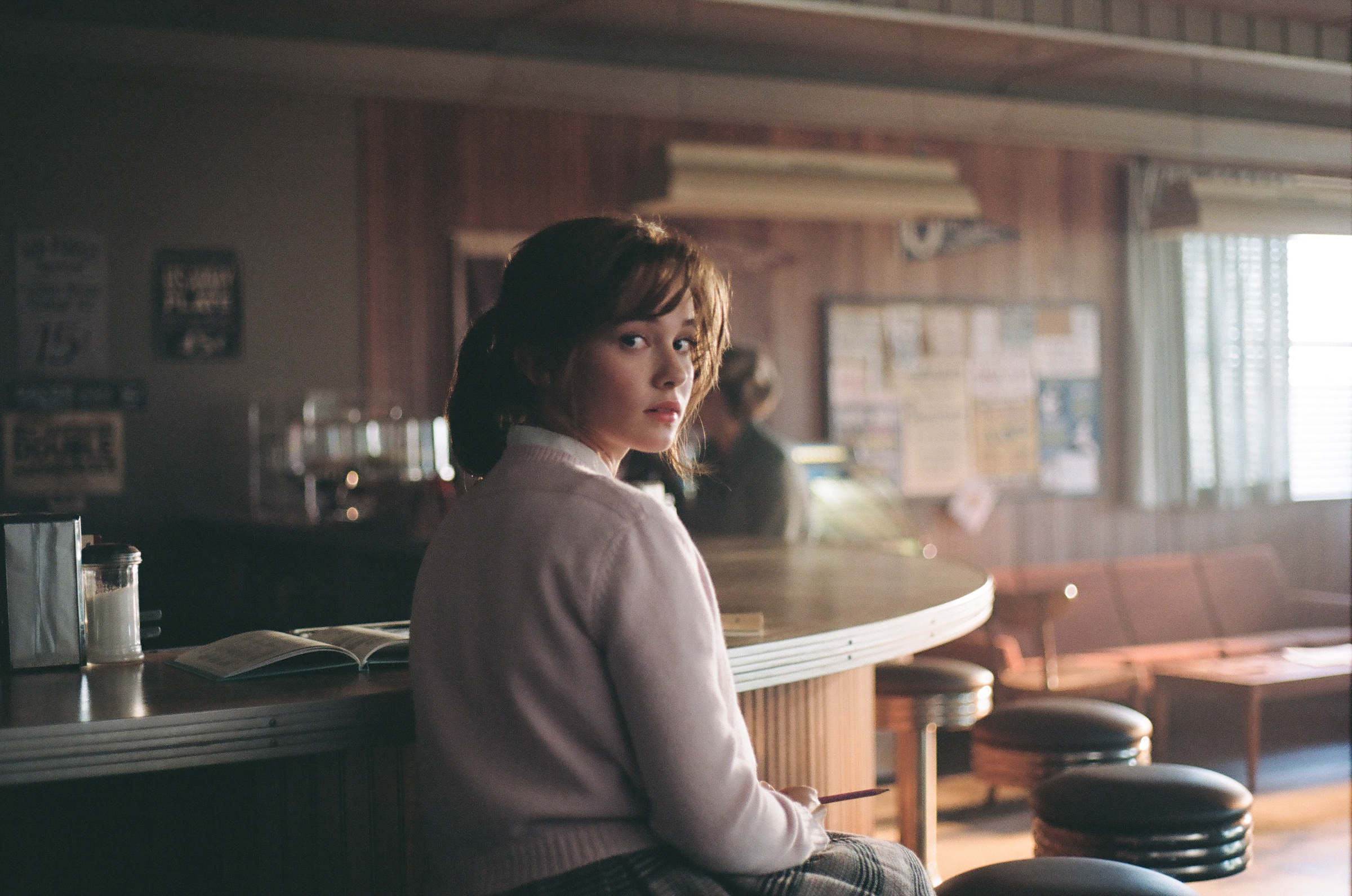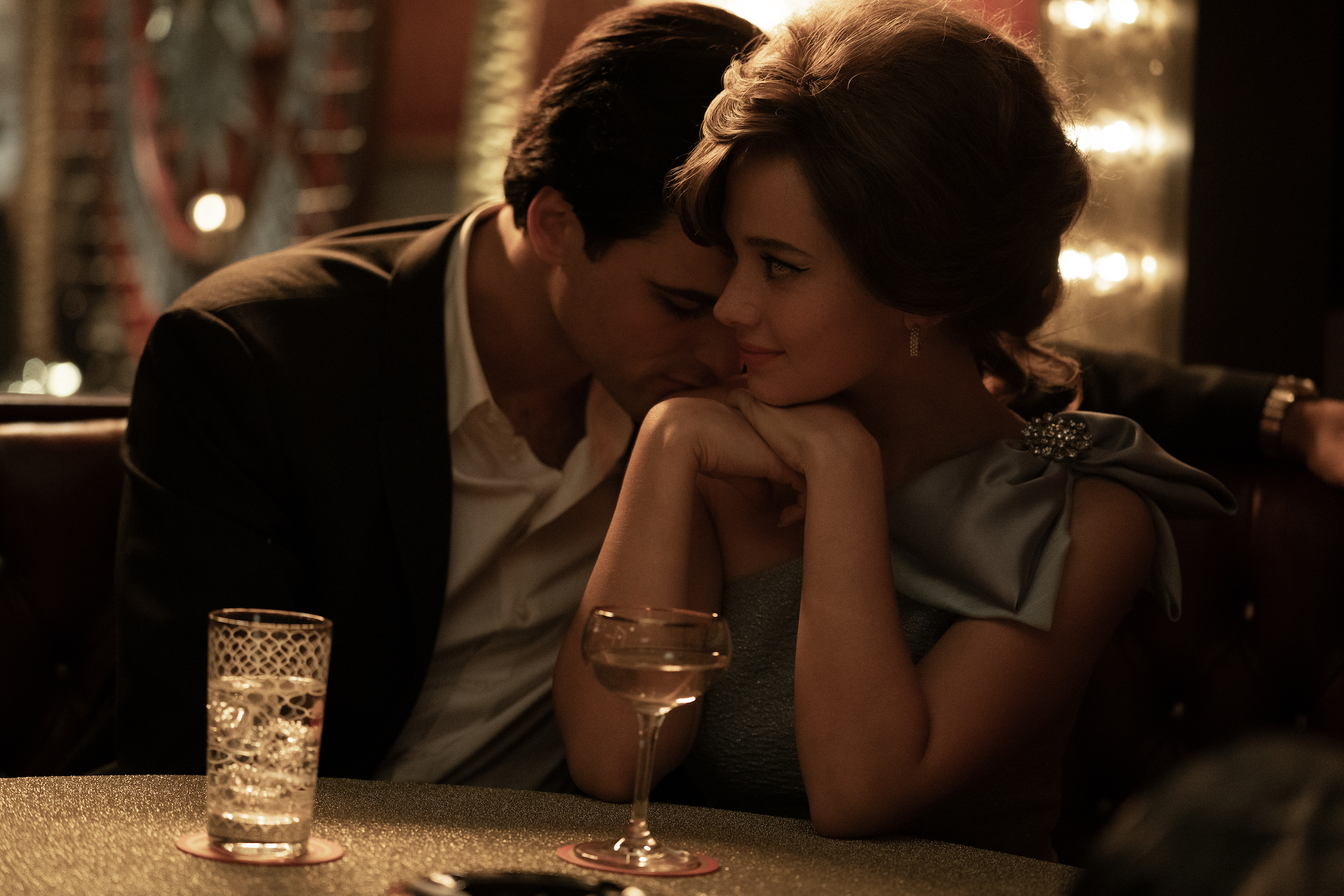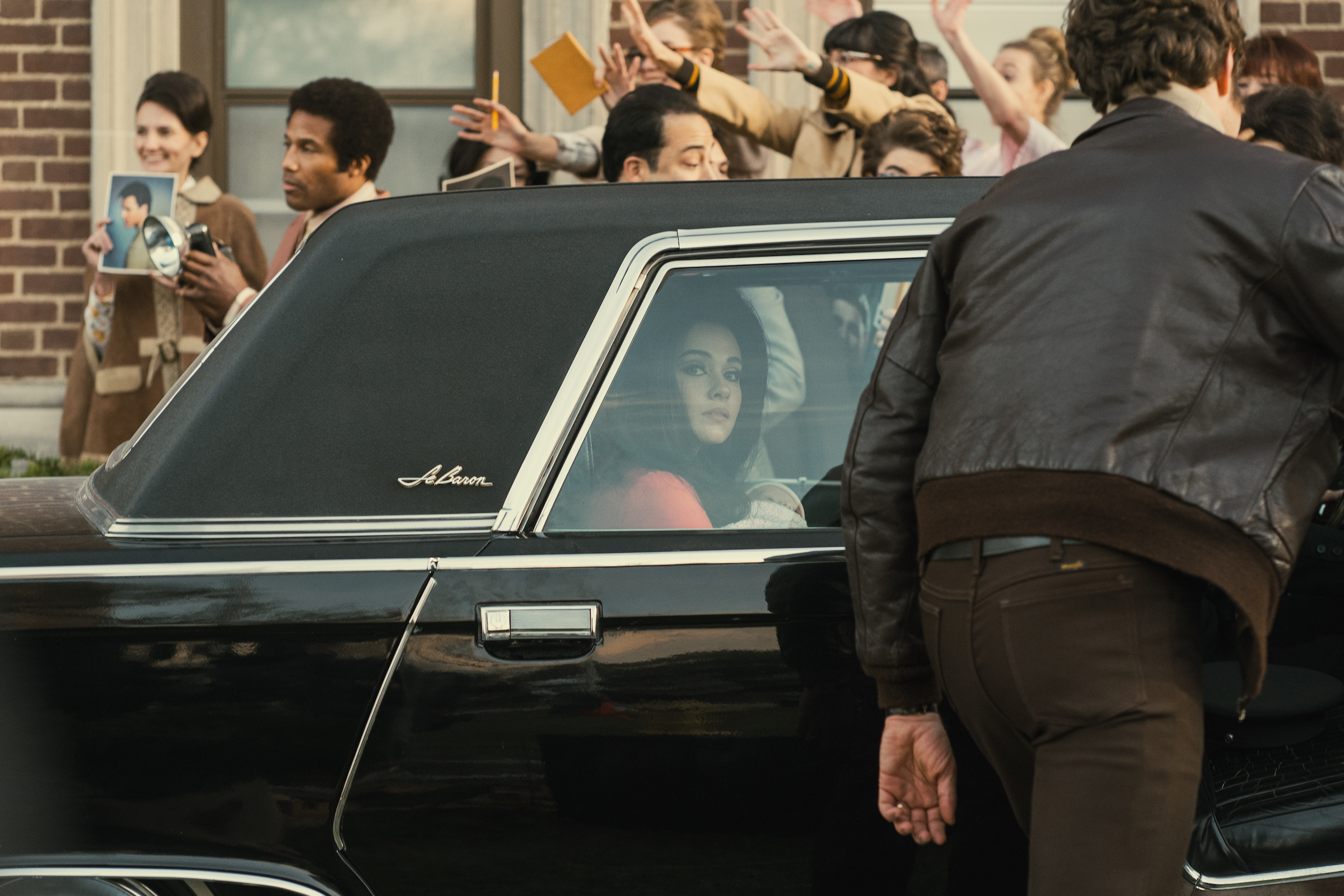Have you ever had an intense experience—fallen madly in love, say—only to look back years later and feel it had happened to a different person, a person who had walked through a dream, and survived it, to get to the self you were destined to become? That’s the feeling Sofia Coppola captures in her quietly extraordinary Priscilla, which is adapted from the story told by Priscilla Presley in her candid and moving 1985 memoir Elvis and Me. Maybe we all have to survive our teenage dreams; the things we want at age 14 are rarely the best for the long term, and luckily, most of us don’t get them. But the teenage Priscilla Presley got what she yearned for. Priscilla invites us to walk side-by-side with her, but not so we can ultimately be punished by the fallacy of her dream; rather, this is a story about deep, cavernlike loneliness, and how one person’s responding to the loneliness of another can be both an adventure and a destiny. So much of being a teenage girl is just waiting for your chance to be; this is the story of one who refused to wait.
Cailee Spaeny plays the 14-year-old Priscilla, an Air Force kid living in 1959 Wiesbaden, West Germany, with her siblings and parents—her dad is a captain. Coppola captures young Priscilla’s ennui—and her seraphic, unassuming beauty—as she sits at an airbase snack bar, the moony strains of Frankie Avalon’s “Venus,” a song about wanting the unattainable, swirls around her. (It's a starry-eyed cover by the band Phoenix.) A good-looking older guy asks her if she likes Elvis Presley. Would she like to meet him? It seems creepy. Priscilla is sure her protective parents won’t let her go. But the guy meets with her father and persuades him all will be OK. Priscilla anxiously chooses her dress—she can’t wear her Easter dress! she moans to her mother—and is whisked off in the car Elvis has sent for her. When she arrives at his house, he’s rollicking at the piano, a group of admiring young women (as opposed to teenage girls) clustered around him. Eventually, he makes his way over to this shy but self-possessed young person and asks if she’s a junior or senior in high school. When he finds out she’s in the ninth grade, he laughs, and says, “You’re just a bay-buh,” the last syllable just a ghost of a sound, a little bit of Tennessee he carries with him always. “Thanks,” she says drily, clearly insulted, as any self-respecting 14-year-old girl would be. He laughs again.

Elvis, played by Jacob Elordi (of the Kissing Booth movies, and also Emerald Fennell’s upcoming Saltburn) likes this girl, and he feels he can talk to her. Her parents are persuaded to let her visit him again, and again. He tells her how much he misses his mother, who’d died not even a year earlier. He is just so deeply lonely—and this isn’t a come-on, it’s the truth. She listens not just with sympathy, but with something much deeper, a pure eagerness to let this strange, sad man—who just happens to be outrageously famous—fill her with his bounteous woe. She can carry as much as he can pour into her; she’s that strong. She’s not a bay-buh.
Coppola carries us through both the early, secret-garden bliss of this love story and the darker tunnels of confusion that later spring up in Priscilla’s path. Her trademark quick-shot montages—an extreme closeup of a kitty-cat eyeliner swoop, a pair of stilettos adorned with daisies, a can of AquaNet hairspray—roll back time to a mid-1960s girly world, where the right makeup and accoutrements could mean the difference between an eternity of married joy or a prison of old-maidhood. Shot by Philippe Le Sourd, often in deep, secretive tones, the movie is so intimate it seems to take place inside a seashell, with both the coziness and the claustrophobia that implies.
Read More: The True Story Behind Elvis and Priscilla Presley’s Relationship
And Coppola’s use of the anachronistic pop song is nonpareil: after Elvis bestows his first, gentle kiss on Priscilla’s lips, she enters a fugue state, having shifted to new plane of existence. At that point, it’s Tommy James and the Shondells’ “Crimson & Clover” that cocoons around her like a whisper, a song from the future, a haunting in advance. (It wouldn’t be released until 1968, the year after Elvis and Priscilla’s marriage.) Elvis is so tender with his very young love—until he’s not. After he has been discharged from the service and goes back to the States, he starts making movies again, often embarking on romances with his co-stars, the clearly irresistible Ann-Margret among them. Priscilla, still in Germany, picks up on her almost-beau's broken promises by reading the newspapers. Coppola shows her paging through them, feeling adrift—Elvis had made her feel necessary, indisposable, adult. Now she was a kid again. He doesn't call her—and then he does, out of the blue. First she’s visiting him in Graceland; later, he’ll persuade her parents, with his well-mannered Southern charm and the sense of duty his mother, Gladys, had instilled in him, to allow her to come to Memphis—she'll move into his swanky, idiosyncratically decorated mansion, Graceland—and finish out high school there. Amazingly, they allow it.

But Elvis’s love comes entwined with a need to control. When he takes Priscilla shopping—his entourage of laughing, joshing guy friends always in tow—he wants to reshape her. She steps out in a dazzling golden leafy-brocade gown—the radiance of her face signals that she loves it—but he waves it away, telling her she can’t wear prints. He urges her to dye her hair black, and tells her that heavy eye makeup will bring out her eyes, a lie of the devil told by a man who knows no better. He wants her, it seems, to look more like himself, as if he were seeking a missing half—perhaps that’s an all-too-obvious metaphor for Elvis’s twin, Jesse Aaron, who died at birth, but there you have it.
It gets worse: A fan of pills of all kinds, he gives her something to sleep that ends up knocking her out for two days. He flies into a rage during a pillow fight, hitting her accidentally, or perhaps not, in the face. He wants their union to be chaste until marriage; and then, after their consummation results in a child, Lisa Marie, he refuses to touch her.
It all sounds horrible, and it is. But Coppola makes it clear, as Elvis and Me does, that nestled within the darkness of this union was an incomparable tenderness, something Priscilla Presley could never get over. We see an early kiss between them, Elvis’s slightly open mouth just brushing hers. That’s how levitation is achieved, when you’re young and in love. Elordi makes a fine Elvis, though a very different one from the flashy performer Austin Butler gave us last year, in Baz Luhrmann’s Elvis. This is the private Elvis, and Elordi plays him as a man who floats further and further away from the woman he loves, like an astronaut whose tether has been cut, even though he yearns for closeness and connection. He’s not a bad guy; he’s just a mess. And in this story, he’s just an accessory to the heroine. It’s not his story.
Spaeny gives such an intimate, lived-in performance that some viewers may not think it’s enough. That’s because she’s playing Priscilla as an observer, a young woman who gradually sees what’s wrong with her life and her screwed-up partner, but who, by the movie’s end, can barely reckon with what’s happened to her over the past 10 years. And if you were in her satin stilettos, could you? Spaeny’s Priscilla, open-hearted yet wary, compliant yet cautious, is a young woman in navigation mode, the subject of many of Coppola’s movies (The Virgin Suicides, Marie Antoinette, Lost in Translation). She’s not demonstrating anything for us; she’s merely allowing us to travel with her.

In the epilogue to her memoir—which was co-written by Sandra Harmon—Presley noted with dismay that so many books about her late ex-husband had focused on his temper tantrums, his drug abuse, his various eccentricities. “I wanted to write about love and precious, wonderful moments and ones filled with grief and disappointments, about a man’s triumphs and defeats, much of it with a child-woman at his side, feeling and experiencing his pain and joys as if they were one.”
Presley’s memoir is based on facts, events, and her own experience. But Priscilla is a story told from within that experience—there’s no false knowingness about how bad things are going to get, no sense of portent, no “Of course, she should have known better than to trust a guy like that” assessment of the way young Priscilla Beaulieu fell so crazily, sweetly in love. Instead, Coppola draws us into the immediacy of young Priscilla’s desires, the way her friendship-turned-romance with one extremely lonely man represented, for a time, everything she wanted out of life. Somehow, even though we know how tragically the story turns out, we want it for her too. A child-woman is a future unto herself; Priscilla’s future just came earlier than most, swept in by a man who truly loved her, inasmuch as he knew how to love. Coppola’s movie ends almost abruptly—it feels a little wrong, until you realize that it’s the only possible ending. You ask yourself, What did I just see? What just happened? Because you’re waking up just as Priscilla Beaulieu Presley is, having walked with her through her dream of becoming.
More Must-Reads from TIME
- Cybersecurity Experts Are Sounding the Alarm on DOGE
- Meet the 2025 Women of the Year
- The Harsh Truth About Disability Inclusion
- Why Do More Young Adults Have Cancer?
- Colman Domingo Leads With Radical Love
- How to Get Better at Doing Things Alone
- Michelle Zauner Stares Down the Darkness
Contact us at letters@time.com